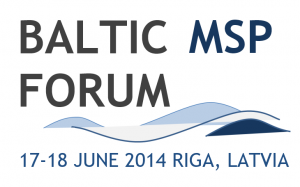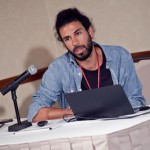 Workshop: Science input for the implementation of the MSP directive
Workshop: Science input for the implementation of the MSP directive
Host: ICES (International Council for the Exploration of the Sea)
Presentations
- Anne Cooper, ICES Advisory Programme Professional Officer: MSP – challenges for ICES advice – download
- Wojciech Wawrzynski, ICES Projects Coordinator: Science contribution to EU Directives – lessons learnt from implementation of the MSFD in the view of the MSP Directive - download
- Kira Gee, ICES Working Group Marine Planning and Coastal Zone Management: The ICES Working Group for Marine Planning and Coastal Zone Management - download
- Periklis Panagiotidis, ICES Data Centre: ICES GIS facility, data storages and products - download
Workshop summary
In this workshop the relation of the work of the International Council for the Exploration of the Sea (ICES) to MSP was presented.
ICES as an organisation is dedicated to global ocean sustainability. It has three main pillars: advisory services, science/research as well as data and information. Moreover it has a huge network of actors and experts in the field. ICES works on the following topics: fisheries, renewable energies, marine and coastal uses and conflicts, the cultural dimension of ecosystem goods and services as well as risk assessment procedures. MSP requires a legal framework, consistency of approaches among neighbouring countries, stakeholder input, public participation as well as best possible scientific input. Given ICES’ focus areas, it can contribute significantly to the implementation of MSP processes.
 ICES has given scientific input to the implementation process of the Water Framework Directive (WFD) as well as for the Marine Strategy Framework Directive (MSFD). The contribution made to the latter directive was outlined. ICES provides advice to the so-called “marine directors”, i.e. the heads of the bodies responsible for MSFD implementation, as well as to lower level working groups. Furthermore, ICES was engaged in several research projects that helped underpin the implementation of the MSFD directive scientifically. One example is the STAGES project, which assessed the prevailing knowledge base, identified knowledge gaps and worked out recommendations for a Europe-wide science policy interface platform. For the MSP Directive ICES has, so far, helped develop the computer simulation game “MSP challenge” together with the Dutch Ministry of Infrastructure. It can be expected that ICES will provide more scientific input to the implementation of the EU MSP Directive in the future.
ICES has given scientific input to the implementation process of the Water Framework Directive (WFD) as well as for the Marine Strategy Framework Directive (MSFD). The contribution made to the latter directive was outlined. ICES provides advice to the so-called “marine directors”, i.e. the heads of the bodies responsible for MSFD implementation, as well as to lower level working groups. Furthermore, ICES was engaged in several research projects that helped underpin the implementation of the MSFD directive scientifically. One example is the STAGES project, which assessed the prevailing knowledge base, identified knowledge gaps and worked out recommendations for a Europe-wide science policy interface platform. For the MSP Directive ICES has, so far, helped develop the computer simulation game “MSP challenge” together with the Dutch Ministry of Infrastructure. It can be expected that ICES will provide more scientific input to the implementation of the EU MSP Directive in the future.
Many of ICES’ working groups deal with MSP related issues. The Working Group for Marine Planning and Coastal Zone Management (WGMPCZM) is especially dedicated to this topic. About 50 scientists from different disciplines as well as planners are members to the WGMPCZM. Meetings take place once a year. Additional experts can be invited to meetings, if required. This working group works on conceptual issues and examines empirical cases. The WGMPCZM publishes cooperative research reports serving as guidance to MSP practitioners. Main themes are: risk management approaches in MSP and ecosystem based management, process of MSP and ecosystem based management and the inclusion of cultural values. In the period from 2014 to 2016 the WGMPCZM will review relevant activities for MSP in various ICES member states and compile a development report. Furthermore, approaches and methods to develop and incorporate thresholds of acceptable environmental, social and economic changes in the context of MSP are being worked out. A typology of conflicts is being set-up and a training course for MSP in the context of the aforementioned simulation game are also on the group’s agenda. In addition, the WGMPCZM supports the ICES Data Centre in working out a strategy of how to provide data that are actually useful to planners.
 The ICES Data Centre is concerned with the provision of data. Data are free and publicly accessible. The ICES Spatial Facility is especially relevant with regard to MSP. It is a collection of online and offline tools as well as of spatial data sets. It includes data and metadata. In addition to the regular database, there is a popular advice web application for people without a scientific background. For the extension of the database, MFSD and MSP related data are priorities in the subsequent four years. The data flow does not only involve feeding databases, i.e. deciding which data are needed, collecting and cleansing them. ICES also develops indicators to measure relevant processes and provides analyses in its final assessment products.
The ICES Data Centre is concerned with the provision of data. Data are free and publicly accessible. The ICES Spatial Facility is especially relevant with regard to MSP. It is a collection of online and offline tools as well as of spatial data sets. It includes data and metadata. In addition to the regular database, there is a popular advice web application for people without a scientific background. For the extension of the database, MFSD and MSP related data are priorities in the subsequent four years. The data flow does not only involve feeding databases, i.e. deciding which data are needed, collecting and cleansing them. ICES also develops indicators to measure relevant processes and provides analyses in its final assessment products.
Video recording
Part 1
Part 2
Part 3
Part 4

